- Home
- Franz Kafka
The Complete Stories Page 3
The Complete Stories Read online
Page 3
I sat at a tiny table — it had three curved, thin legs — sipping my third glass of benedictine, and while I drank I surveyed my little store of pastry which I myself had picked out and arranged in a pile.
Then I saw my new acquaintance, somewhat dishevelled and out of shape, appear at the doorpost of an adjoining room; but I tried to look away for it was no concern of mine. He, however, came toward me and, smiling absent-mindedly at my occupation, said: "Excuse me for disturbing you, but until this very moment I've been sitting alone with my girl in the room next door. Ever since half-past ten. Lord, what an evening! I know it isn't right for me to be telling you this, for we hardly know one another. We only met on the stairs this evening and exchanged a few words as guests of the same house. And now — but you must forgive me, please — my happiness just cannot be contained, I can't help it. And since I have no other acquaintance here whom I can trust —"
I looked at him sadly — the piece of fruitcake which I had in my mouth did not taste particularly good — and said into his rather flushed face: "I'm glad of course that you consider me trustworthy, but displeased that you have confided in me. And you yourself, if you weren't in such a state, would know how improper it is to talk about an amorous girl to a man sitting alone drinking schnapps."
When I said this, he sat down with a jolt, leaned back in his chair, and let his arms hang down. Then he pressed them back, his elbows pointed, and began talking in rather a loud voice: "Only a little while ago we were alone in that room, Annie and I. And I kissed her, I kissed her — her mouth, her ears, her shoulders. Oh, my Lord and Savior!"
A few guests, suspecting ours to be a rather more animated conversation, approached us closer, yawning. Whereupon I stood up and said so that all could hear: "All right then, if you insist, I'll go with you, but I repeat: it's ridiculous to climb up the Laurenziberg now, in winter and in the middle of the night. Besides, it's freezing, and as it has been snowing the roads out there are like skating rinks. Well, as you like —"
At first he gazed at me in astonishment and parted his wet lips; but then, noticing the guests who had approached quite close, he laughed, stood up, and said: "I think the cold will do us good; our clothes are full of heat and smoke; what's more, I'm slightly tipsy without having drunk very much; yes, let's say goodbye and go."
So we went to the hostess, and as he kissed her hand she said: "I am glad to see you looking so happy today."
Touched by the kindness of these words, he kissed her hand again; whereupon she smiled. I had to drag him away. In the vestibule stood a housemaid, whom we hadn't seen before. She helped us into our coats and then took a small lantern to light us down the stairs. Her neck was bare save for a black velvet ribbon around her throat; her loosely clothed body was stooped and kept stretching as she went down the stairs before us, holding the lantern low. Her cheeks were flushed, for she had drunk some wine, and in the weak lamplight which filled the whole stairwell, I could see her lips trembling.
At the foot of the stairs she put down the lantern, took a step toward my acquaintance, embraced him, kissed him, and remained in the embrace. Only when I pressed a coin into her hand did she drowsily detach her arms from him, slowly open the front door, and let us out into the night.
Over the deserted, evenly lit street stood a large moon in a slightly clouded, and therefore unusually extended, sky. On the frozen snow one had to take short steps.
Hardly were we outside when I evidently began to feel very gay. I raised my legs, let my joints crack, I shouted a name down the street as though a friend of mine had just vanished around the corner; leaping, I threw my hat in the air and caught it boastfully.
My acquaintance, however, walked on beside me, unconcerned. He held his head bent. He didn't even speak.
This surprised me, for I had calculated that he, once I had got him away from the party, would give vent to his joy. Now I too could calm down. No sooner had I given him an encouraging slap on the back than I suddenly no longer understood his mood, and withdrew my hand. Since I had no use for it, I stuck it in the pocket of my coat.
So we walked on in silence. Listening to the sound of our steps, I couldn't understand why I was incapable of keeping step with my acquaintance — especially since the air was clear and I could see his legs quite plainly. Here and there someone leaned out of a window and watched us.
On turning into the Ferdinandstrasse I realized that my acquaintance had begun to hum a melody from the Dollar Princess. It was low, but I could hear it distinctly. What did this mean? Was he trying to insult me? As for me, I was ready to do without not only this music, but the walk as well. Why wasn't he speaking to me, anyway? And if he didn't need me, why hadn't he left me in peace in the warm room with the benedictine and the pastry? It certainly wasn't I who had insisted on this walk. Besides, I could have gone for a walk on my own. I had merely been at a party, had saved an ungrateful young man from disgrace, and was now wandering about in the moonlight. That was all right, too. All day in the office, evenings at a party, at night in the streets, and nothing to excess. A way of life so natural that it borders on the excessive!
Yet my acquaintance was still behind me. Indeed, he even quickened his steps when he realized that he had fallen in the rear. No word was uttered, nor could it be said that we were running. But I wondered if it wouldn't be a good idea to turn down a side street; after all, I wasn't obliged to go on this walk with him. I could go home alone and no one could stop me. Then, secretly, I could watch my acquaintance pass the entrance to my street. Goodbye, dear acquaintance! On reaching my room I'll feel warm, I'll light the lamp in its iron stand on my table, and when I've done that I'll lie back in my armchair which stands on the torn Oriental carpet. Pleasant prospects! Why not? But then? No then. The lamp will shine in the warm room, shine on my chest as I lie in the armchair. Then I'll cool off and spend hours alone between the painted walls and the floor which, reflected in the gilt-framed mirror hanging on the rear wall, appears slanted.
My legs were growing tired and I had already decided to go home and lie down, when I began to wonder if, before going away, I ought to say good night to my acquaintance. But I was too timid to go away without a word and too weak to call to him out loud. So I stood still, leaned against the moonlit wall of a house, and waited.
My acquaintance came sailing along the pavement toward me as fast as though he expected me to catch him. He winked at me, suggesting some agreement which I had apparently forgotten.
"What's up?" I asked.
"Oh, nothing," he said. "I only wanted to ask your opinion about that housemaid who kissed me on the staircase. Who is the girl? Have you ever seen her before? No? Nor have I. Was she a housemaid at all? I had meant to ask you this before, while she was walking down the stairs in front of us."
"I saw at once by her red hands that she's a housemaid, and not even the first housemaid, and when I gave her the money I felt her hard skin."
"But that merely proves that she has been some time in service, which no doubt is the case."
"You may be right about that. In that light one couldn't distinguish everything, but her face reminded me of the elder daughter of an officer I happen to know."
"Not me," he said.
"That won't stop me going home; it's late and I have to be in the office early. One sleeps badly there." Whereupon I put out my hand to say goodbye to him.
"Whew, what a cold hand!" he cried. "I wouldn't like to go home with a hand like that. You should have let yourself be kissed, too, my friend. That was an omission. Still, you can make up for it. But sleep? On a night like this? What an idea! Just think how many thoughts a blanket smothers while one lies alone in bed, and how many unhappy dreams it keeps warm."
"I neither smother anything nor warm anything," I said.
"Oh, go on!" he concluded, "you're a humorist!"
At the same time he began walking again and I followed without realizing it, for I was busy thinking of what he had said.
From th
ese words I imagined that my acquaintance suspected in me something which, although it wasn't there, made me nevertheless rise in his estimation by his suspecting it. So it was just as well I hadn't gone home. Who knows, this man — thinking of housemaid affairs while walking beside me, his mouth steaming with cold — might be capable of bestowing on me in the eyes of the world a value without my having to work for it. Let's pray the girls won't spoil him! By all means let them kiss and hug him, that's their duty and his right, but they mustn't carry him off. After all, when they kiss him they also kiss me a little — with the corners of their mouths, so to speak. But if they carry him off, then they steal him from me. And he must always remain with me, always. Who is to protect him, if not I? And he's so stupid. Someone says to him in February: Come up the Laurenziberg — and off he goes. And supposing he falls down now, or catches cold? Suppose some jealous man appears from the Postgasse and attacks him? What will happen to me? Am I to be just kicked out of the world? I'll believe that when I see it! No, he won't get rid of me.
Tomorrow he'll be talking to Fräulein Anna, about ordinary things at first, as is natural, but suddenly he won't be able to keep it from her any longer: Last night, Annie, after the party, you remember, I was with a man the like of whom you've certainly never seen. He looked — how can I describe him to you? — like a stick dangling in the air, he looked, with a black-haired skull on top. His body was clad in a lot of small, dull-yellow patches of cloth which covered him completely because they hung closely about him in the still air of last night. Well, Annie, does that spoil your appetite? It does? In that case it's my fault, then I told the whole thing badly. If only you'd seen him, walking timidly beside me, reading infatuation on my face (which wasn't very difficult), and going a long way ahead of me so as not to disturb me. I think, Annie, you'd have laughed a bit and been a bit afraid; but I was glad of his company. For where were you, Annie? You were in your bed, and your bed was far away — it might just as well have been in Africa. But sometimes I really felt as though the starry sky rose and fell with the gasping of his flat chest. You think I'm exaggerating? No, Annie. Upon my soul, no. Upon my soul which belongs to you, no.
And I didn't spare my acquaintance — we had just reached the first steps of the Franzensquai — the smallest fraction of the humiliation he must have felt at making such a speech. Save that my thoughts grew blurred at this moment, for the Moldau and the quarter of the town on the farther shore lay together in the dark. A number of lights burning there teased the eye.
We crossed the road in order to reach the railing along the river, and there we stood still. I found a tree to lean against. Because of the cold blowing up from the water, I put on my gloves, sighed for no good reason, as one is inclined to do at night beside a river, but then I wanted to walk on. My acquaintance, however, was staring into the water, and didn't budge. Then he moved closer to the railing; his legs were already against the iron bar, he propped his elbows up and laid his forehead in his hands. What next? After all, I was shivering and had to put up the collar of my coat. My acquaintance stretched himself — his back, shoulders, neck — and held the upper half of his body, which rested on his taut arms, bent over the railing.
"Oh well, memories," said I. "Yes, even remembering in itself is sad, yet how much more its object! Don't let yourself in for things like that, it's not for you and not for me. It only weakens one's present position without strengthening the former one — nothing is more obvious — quite apart from the fact that the former one doesn't need strengthening. Do you think I have no memories? Oh, ten for every one of yours. Now, for instance, I could remember sitting on a bench in L. It was in the evening, also near a river. In summer, of course. And on such evenings it's my habit to pull up my legs and put my arms around them. I had leaned my head against the wooden back of the bench, and from there I watched the cloudlike mountains on the other shore. A violin was playing softly in the hotel by the river. Now and again on both shores trains chuffed by amid shining smoke."
Turning suddenly around, my acquaintance interrupted me; he almost looked as though he were surprised to see me still here. "Oh, I could tell you much more," I said, nothing else.
"Just imagine," he began, "and it always happens like this. Today, as I was going downstairs to take a short walk before the evening party, I couldn't help being surprised by the way my hands were dangling about in my cuffs, and they were doing it so gaily. Which promptly made me think: Just wait, something's going to happen today. And it did, too." He said this while turning to go and looked at me smiling out of his big eyes.
So I had already got as far as that. He could tell me things like that and at the same time smile and look at me with big eyes. And I — I had to restrain myself from putting my arm around his shoulders and kissing him on the eyes as a reward for having absolutely no use for me. But the worst was that even that could no longer do any harm because it couldn't change anything, for now I had to go away, away at any price.
While I was still trying urgently to think of some means by which I could stay at least a little while longer with my acquaintance, it occurred to me that perhaps my long body displeased him by making him feel too small. And this thought — although it was late at night and we had hardly met a soul — tormented me so much that while walking I bent my back until my hands reached my knees. But in order to prevent my acquaintance from noticing my intentions I changed my position only very gradually, tried to divert his attention from myself, once even turning him toward the river, pointing out to him with outstretched hands the trees on the Schutzeninsel and the way the bridge lamps were reflected in the river.
But wheeling suddenly around, he looked at me — I hadn't quite finished yet — and said: "What's this? You're all crooked! What on earth are you up to?"
"Quite right. You're very observant," said I, my head on the seam of his trousers, which was why I couldn't look up properly.
"Enough of that! Stand up straight! What nonsense!"
"No," I said, my face close to the ground, "I'll stay as I am."
"You really can annoy a person, I must say. Such a waste of time! Come on, put an end to it."
"The way you shout! In the quiet of the night!" I said.
"Oh well, just as you like," he added, and after a while: "It's a quarter to one." He had evidently seen the time on the clock of the Mühlenturm.
I promptly stood up straight as though I'd been pulled up by the hair. For a while I kept my mouth open, to let my agitation escape. I understood: he was sending me away. There was no place for me near him, or if there were one, at least it could not be found. Why, by the way, was I so intent on staying with him? No, I ought to go away — and this at once — to my relatives and friends who were waiting for me. But if I didn't have any relatives and friends then I must fend for myself (what was the good of complaining!), but I must leave here no less quickly. For in his eyes nothing could redeem me any longer, neither my length, my appetite, nor my cold hand. But if I were of the opinion that I had to remain with him, it was a dangerous opinion.
"I wasn't in need of your information," I said, which happened to be true.
"Thank God you're standing up straight again. All I said was that it's a quarter to one."
"That's all right," said I, and stuck two fingernails in the gaps between my chattering teeth. "If I didn't need your information, how much less do I need an explanation. The fact is, I need nothing but your mercy. Please, take back what you said just now!"
"That it's a quarter to one? But with pleasure, especially since a quarter to one passed long ago."
He lifted his right arm, flicked his hand, and listened to the castanetlike sound of his cuff links.
Obviously, this is the time for the murder. I'll stay with him and slowly he'll draw the dagger — the handle of which he is already holding in his pocket — along his coat, and then plunge it into me. It's unlikely that he'll be surprised at the simplicity of it all — yet maybe he will, who knows? I won't scream, I'll just s
tare at him as long as my eyes can stand it.
"Well?" he said.
In front of a distant coffeehouse with black windowpanes a policeman let himself glide over the pavement like a skater. His sword hampering him, he took it in his hand, and now he glided along for quite a while, finally ending up by almost describing a circle. At last he yodeled weakly and, melodies in his head, began once more to skate.
It wasn't until the arrival of this policeman — who, two hundred feet from an imminent murder, saw and heard only himself — that I began to feel a certain fear. I realized that whether I allowed myself to be stabbed or ran away, my end had come. Would it not be better, then, to run away and thus expose myself to a difficult and therefore more painful death? I could not immediately put my finger on the reasons in favor of this form of death, but I couldn't afford to spend my last remaining seconds looking for reasons. There would be time for that later provided I had the determination, and the determination I had.
I had to run away, it would be quite easy. At the turning to the left onto the Karlsbrücke I could jump to the right into the Karlsgasse. It was winding, there were dark doorways, and taverns still open; I didn't need to despair.
As we stepped from under the arch at the end of the quay onto the Kreuzherrenplatz, I ran into that street with my arms raised. But in front of a small door in the Seminarkirche I fell, for there was a step which I had not expected. It made a little noise, the next street lamp was sufficiently far away, I lay in the dark.
From a tavern opposite came a fat woman with a lantern to see what had happened in the street. The piano within continued playing, but fainter, with only one hand, because the pianist had turned toward the door which, until now ajar, had been opened wide by a man in a high-buttoned coat. He spat and then hugged the woman so hard she was obliged to raise the lantern in order to protect it.
"Nothing's happened!" he shouted into the room, whereupon they both turned, went inside, and the door was closed.

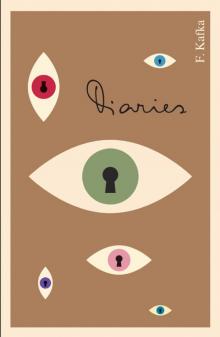 Diaries of Franz Kafka
Diaries of Franz Kafka Metamorphosis and Other Stories
Metamorphosis and Other Stories The Castle: A New Translation Based on the Restored Text
The Castle: A New Translation Based on the Restored Text The Complete Stories
The Complete Stories In the Penal Colony
In the Penal Colony The Trial
The Trial Amerika
Amerika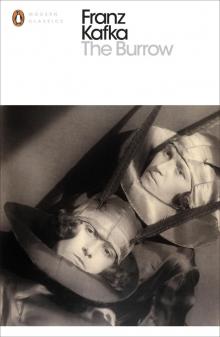 The Burrow: Posthumously Published Short Fiction
The Burrow: Posthumously Published Short Fiction Sons
Sons Letters to Milena
Letters to Milena Investigations of a Dog: And Other Creatures
Investigations of a Dog: And Other Creatures Collected Stories
Collected Stories The Great Wall of China
The Great Wall of China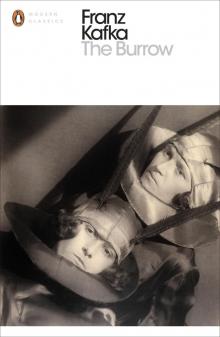 The Burrow
The Burrow The Castle
The Castle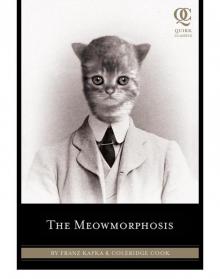 The Meowmorphosis
The Meowmorphosis The Sons
The Sons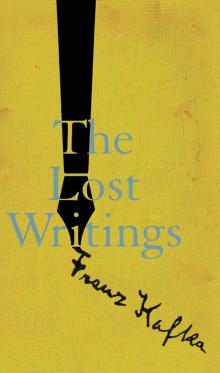 The Lost Writings
The Lost Writings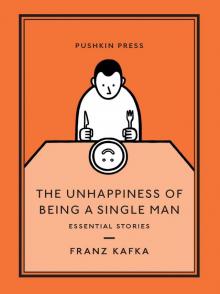 The Unhappiness of Being a Single Man
The Unhappiness of Being a Single Man Amerika: The Missing Person: A New Translation, Based on the Restored Text
Amerika: The Missing Person: A New Translation, Based on the Restored Text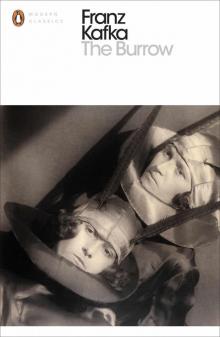 The Burrow: Posthumously Published Short Fiction (Penguin Modern Classics)
The Burrow: Posthumously Published Short Fiction (Penguin Modern Classics)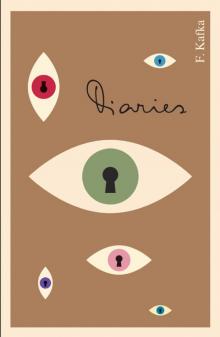 The Diaries of Franz Kafka
The Diaries of Franz Kafka Investigations of a Dog
Investigations of a Dog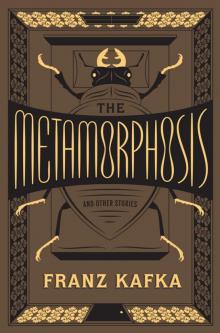 The Metamorphosis and Other Stories
The Metamorphosis and Other Stories The Trial: A New Translation Based on the Restored Text
The Trial: A New Translation Based on the Restored Text